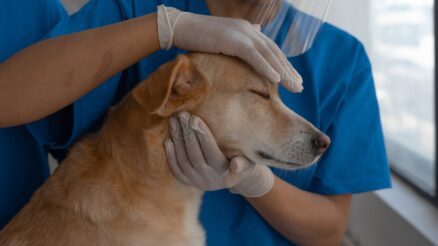Getting a cancer diagnosis is always frightening, significantly when your pet is affected. If your pet is known to have cancer, you probably won’t hear your veterinarian explain your treatment options which will likely involve chemotherapy.
When it comes to treating certain cancer types, chemotherapy is a medicine that can be administered as a stand-alone regimen or given together with other therapies, such as radiation therapy and surgery. Before surgery, or in some very rare instances, chemotherapy can be employed to shrink large tumors or eliminate cancerous cells that are small enough to be completely removed surgically. Chemotherapy may be prescribed after surgery to reduce or stop cancer’s spread throughout the body when the spread of cancer is a major issue.
Myths Versus Facts
As a pet owner, your initial instinct is to learn from all sources possible. Your pet’s friends and family will most likely share their experiences. Unfortunately, there are many misconceptions, and many apply their knowledge of chemotherapy for human cancer to their dogs, even though it’s not the appropriate time for it. Knowing what this medication is and how it works can assist you in choosing the most effective option for your pet.
1. My animal is too old for chemotherapy.
Age is not a disease. Oncologists concentrate their treatment suggestions on your pet’s general condition, not age. Oncology experts will run a battery of diagnostic tests for your animal to evaluate her overall health and develop a treatment plan specifically tailored to her requirements. Regardless of age, doctors may develop a regimen that incorporates a range of cancer treatments. Chemotherapy is usually safe for pets and cats of any age otherwise healthy.
For expert vet care, you can consult specialists at this animal hospital. They offer a wide variety of services for your pets to maintain their overall wellness.
2. My pet may suffer from awful adverse side effects.
If pet owners discover that their pet will undergo chemotherapy, they usually fear the terrible, devastating side consequences. But veterinary chemotherapy is not as harmful as chemotherapy for humans. Chemotherapy in pets has fewer and less severe adverse effects than human chemotherapy because the dosages are smaller and are more evenly distributed.
Dehydration, severe inappetence, diarrhea, vomiting, and nausea are seen in a handful of chemotherapy patients. Most patients get the same treatment with a dose reduction and preventive drugs.
For pets suffering from severe ailments, you have to get in touch with an emergency veterinarian. You can also visit websites like www.bgvets.com for more information.
3. My pet will be in the hospital for a prolonged period.
Your pet’s treatment for cancer aims to make sure that she lives in the most ordinary way possible. Patients aren’t usually hospitalized to undergo treatment, even though she requires frequent check-ups and medicine injections. If complications emerge, it is the only occasion that they’ll require hospitalization. This is rare.
Chemotherapy medications come with a variety of methods of administration. Many chemotherapy treatments can be administered at home by mouth, with periodic hospital visits to monitor your pet’s progress. The team members from the oncology department inject the medications over a short period. Then they schedule chemotherapy appointments, which include lab tests and health evaluations the pet needs to lower the frequency of visits.
For severe illnesses like cancer, your pets should be treated by an expert in vet oncology lexington to properly address the illness and ensure the right treatment of it.
4. My pet has a poor prognosis, and treatment will be futile.
The idea that a dog’s cancer diagnosis can be viewed as a death sentence is a misconception. In the case of chemotherapy and various other treatments, various types of cancer are reversible or curable, giving your pet the chance to return to a normal life. Treatments can often slow the spread of cancer and allow you to spend more time with your closest friend if a cure is not possible. The final weeks or months ought to be as comfortable as possible as treatments can aid in decreasing some of the side effects of cancer, such as nausea and fatigue.
5. My pet will soon be bed-bound and need to stop their daily routine.
Chemotherapy-treated dogs maintain primarily normal lives, despite more frequent appointments with their veterinarians. Most dogs retain their regular routines throughout therapy. Post-treatment lethargy is uncommon and lasts only several days. There’s no reason to separate chemotherapy-treated animals from other household members. Pets may still go on an outing with their owner, sleep in their beds, or participate in other routine activities.


